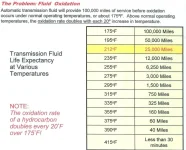DocBrown
Well-known member
- Joined
- Jul 9, 2018
- Messages
- 1,011
- Reaction score
- 223
- Points
- 63
- Buick Ownership
- 2016 Encore Sport Touring
Completely false. I do market analysis on all of a certain type of transmissions for a non-GM company. I recommend that people change their fluid every 30K miles if they want their transmission to live a long life. ATF properties do not stay the same throughout the life of the fluid. There are changes in viscosity and other properties as you accumulate miles on them. Along with that, the clutches inside the transmission are a wear item and will eventually contaminate the fluid.
Even if you stay within "normal" transmission temperatures, the fluid has a finite life. I admit that if you keep your fluid below 180F all the time that you can get long life out your fluid, but most people exceed that value, even with simple stop and go traffic. Also, most cars do not have ATF temperature gauges and even fewer people would actually look at it.
I guess you'd have to explain to me then all the 200k-300k mile sealed transmissions on GM cars that have never had the fluid changed. According to your market analysis these should have all failed. My HHR currently has 165k miles on it. I have no intention of changing the fluid.




